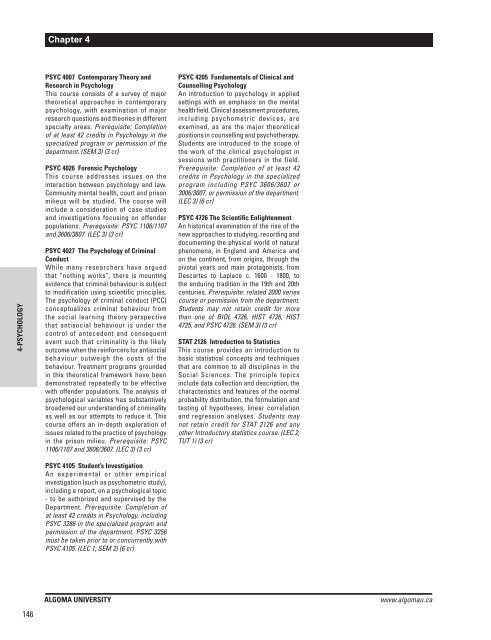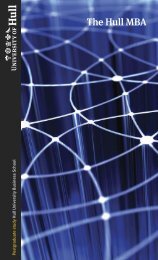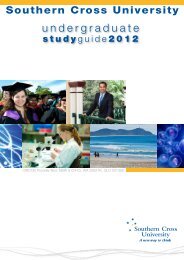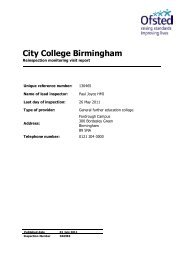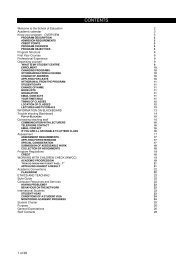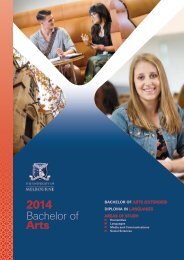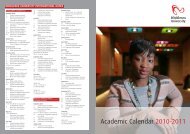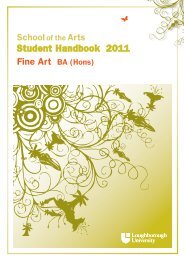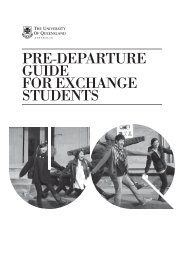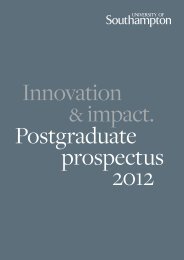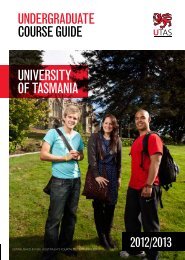You also want an ePaper? Increase the reach of your titles
YUMPU automatically turns print PDFs into web optimized ePapers that Google loves.
Chapter 4<br />
4-PSYCHOLOGY<br />
PSYC 4007 Contemporary Theory and<br />
Research in Psychology<br />
This course consists of a survey of major<br />
theoretical approaches in contemporary<br />
psychology, with examination of major<br />
research questions and theories in different<br />
specialty areas. Prerequisite: Completion<br />
of at least 42 credits in Psychology in the<br />
specialized program or permission of the<br />
department. (SEM 3) (3 cr)<br />
PSYC 4026 Forensic Psychology<br />
This course addresses issues on the<br />
interaction between psychology and law.<br />
Community mental health, court and prison<br />
milieus will be studied. The course will<br />
include a consideration of case studies<br />
and investigations focusing on offender<br />
populations. Prerequisite: PSYC 1106/1107<br />
and 3606/3607. (LEC 3) (3 cr)<br />
PSYC 4027 The Psychology of Criminal<br />
Conduct<br />
While many researchers have argued<br />
that “nothing works”, there is mounting<br />
evidence that criminal behaviour is subject<br />
to modification using scientific principles.<br />
The psychology of criminal conduct (PCC)<br />
conceptualizes criminal behaviour from<br />
the social learning theory perspective<br />
that antisocial behaviour is under the<br />
control of antecedent and consequent<br />
event such that criminality is the likely<br />
outcome when the reinforcers for antisocial<br />
behaviour outweigh the costs of the<br />
behaviour. Treatment programs grounded<br />
in this theoretical framework have been<br />
demonstrated repeatedly to be effective<br />
with offender populations. The analysis of<br />
psychological variables has substantively<br />
broadened our understanding of criminality<br />
as well as our attempts to reduce it. This<br />
course offers an in-depth exploration of<br />
issues related to the practice of psychology<br />
in the prison milieu. Prerequisite: PSYC<br />
1106/1107 and 3606/3607. (LEC 3) (3 cr)<br />
PSYC 4205 Fundamentals of Clinical and<br />
Counselling Psychology<br />
An introduction to psychology in applied<br />
settings with an emphasis on the mental<br />
health field. Clinical assessment procedures,<br />
including psychometric devices, are<br />
examined, as are the major theoretical<br />
positions in counselling and psychotherapy.<br />
Students are introduced to the scope of<br />
the work of the clinical psychologist in<br />
sessions with practitioners in the field.<br />
Prerequisite: Completion of at least 42<br />
credits in Psychology in the specialized<br />
program including PSYC 3606/3607 or<br />
3006/3007, or permission of the department.<br />
(LEC 3) (6 cr)<br />
PSYC 4726 The Scientific Enlightenment<br />
An historical examination of the rise of the<br />
new approaches to studying, recording and<br />
documenting the physical world of natural<br />
phenomena, in England and America and<br />
on the continent, from origins, through the<br />
pivotal years and main protagonists, from<br />
Descartes to Laplace c. 1600 - 1800, to<br />
the enduring tradition in the 19th and 20th<br />
centuries. Prerequisite: related 2000 series<br />
course or permission from the department.<br />
Students may not retain credit for more<br />
than one of BIOL 4726, HIST 4726, HIST<br />
4725, and PSYC 4726. (SEM 3) (3 cr)<br />
STAT 2126 Introduction to Statistics<br />
This course provides an introduction to<br />
basic statistical concepts and techniques<br />
that are common to all disciplines in the<br />
Social Sciences. The principle topics<br />
include data collection and description, the<br />
characteristics and features of the normal<br />
probability distribution, the formulation and<br />
testing of hypotheses, linear correlation<br />
and regression analyses. Students may<br />
not retain credit for STAT 2126 and any<br />
other Introductory statistics course. (LEC 2,<br />
TUT 1) (3 cr)<br />
PSYC 4105 Student’s Investigation<br />
An experimental or other empirical<br />
investigation (such as psychometric study),<br />
including a report, on a psychological topic<br />
- to be authorized and supervised by the<br />
Department. Prerequisite: Completion of<br />
at least 42 credits in Psychology, including<br />
PSYC 3286 in the specialized program and<br />
permission of the department. PSYC 3256<br />
must be taken prior to or concurrently with<br />
PSYC 4105. (LEC 1, SEM 2) (6 cr)<br />
146<br />
ALGOMA UNIVERSITY<br />
www.algomau.ca


